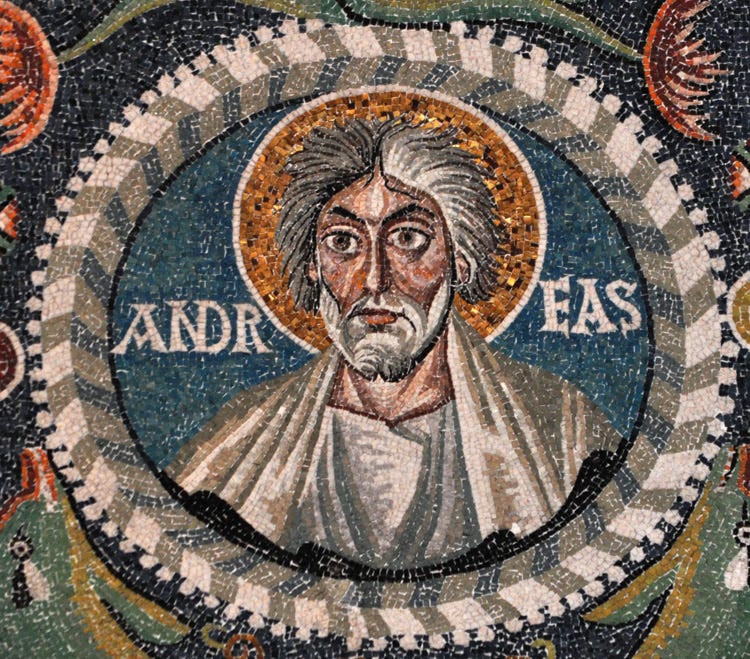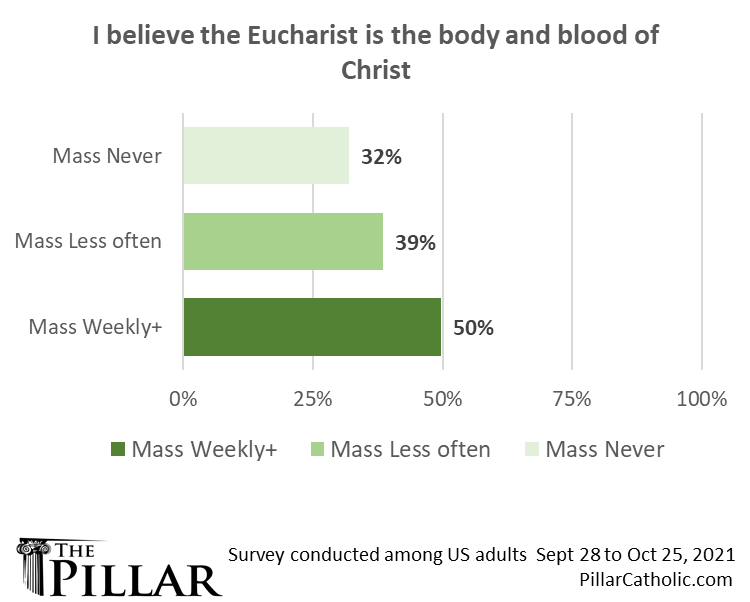Blessed Advent everybody,
Today is the feast of the Apostle St. Andrew, and this is The Tuesday Pillar Post.
According to St. John’s account, St. Andrew heard the Lord, recognized him as the Messiah, and ran to tell his brother Simon: “We have found the Messiah, that is to say, the Christ!”
His brother, of course, became Peter, the rock upon which Christ built the Church. Still, the Greeks call Andrew the Protokletos, the “first-called.” As apostolic nicknames of distinction go, that’s not “Peter,” but it’s no small potatoes, either.
It would really be something to trust, like Andrew did, that God has an extraordinary plan for the people waiting to hear Christ announced from our own lips.

May we be as eager to announce the Messiah, especially to those to whom we are closest, as was St. Andrew. And may the Protokletos intercede for us.
The news
Earlier this month, The Pillar began a series of in-depth reports on our inaugural “Survey on Religious Attitudes and Practice,” a nationally representative poll on the religious identities, perspectives, beliefs, and practices of Americans, and Catholics especially.
We finished the series yesterday with an overview of our most interesting findings.
We also put together an explanation and assessment of our methodology, and published our complete dataset.
Here’s a look at what weekly Massgoers and other Catholics believe about the Eucharist:
—
Paid family leave is being debated by lawmakers, while many corporations are adding family leave policies to boost employee recruitment and retention. But in the Church, and at many pro-life organizations, employee family leave policies vary widely — when they exist at all.
Freelance reporter Claire Swinarski looked at a patchwork of paid family leave policies, asked why more Catholic organizations don’t offer paid maternity leave, and talked with some dioceses doing just that.
And here’s what the HR manager in one diocese offering 12 weeks of paid parental leave — pretty unusual in the Church — told The Pillar:
“We wanted to show care and honor the family, because in the Catholic Church, the family is so important. We really looked at the tenets of social justice and making sure that people did not have to choose to go back to work right away.
So when budgets are tight, how do some dioceses make paid family leave happen?
—
Pope Francis on Friday ordered a Vatican study of whether Italian tribunals — dealing with petitions for annulments — have implemented his 2015 reforms, as spelled out in Mitis iudex.
Why? Well, a lot of it comes down to money.
Could the study impact tribunals in the United States or elsewhere?
—
Vatican prosecutors have suffered a series of setbacks and criticisms for their handling of the criminal case against businessmen Gianluigi Torzi and Raffaele Mincione, both of whom are resident in the UK. But two UK court rulings last week have helped clear the way for the businessmen to face trial.
The Dobbs moment
The Supreme Court on Wednesday will hear oral arguments in Dobbs v. Jackson Women’s Health. The case will consider the Constitutionality of a Mississippi law that bans abortion after 15 weeks of pregnancy: It is a direct challenge to the viability standards of Roe vs. Wade, and widely regarded as the biggest abortion case the Supreme Court has seen in decades.
Observers on all sides of the case agree that the future of abortion in America hangs in the balance. The Court can overturn or dramatically weaken the precedents of both Roe and Planned Parenthood vs. Casey, the two cases that form the foundation of America’s abortion policy — or it can overturn Mississippi’s law, and maintain the federal status quo.
Will that happen? Here’s what we know:
The Court’s justices deliberated for a long time before deciding they would take the case.
The state of Mississippi has explicitly asked the Court to overturn Roe and Casey.
Pro-life voters have spent decades in a political coalition in which the payoff, for them, was supposed to be this moment.
It is clear that three justices will vote against the Mississippi law altogether. It’s not clear whether a plurality of the remaining justices will coalesce to overturn Roe, or whether they’ll settle for a middle ground that alters the standards set by Roe but upholds in principle a Constitutional right to abortion.
If Roe is overturned, abortion policy shifts to the states, and as many as 26 states could be expected to ban or considerably limit abortion. If the Court sets new precedent that shifts or replaces the “viability standard,” many of those same states will pass new regulations on abortion.
The Court’s decision impacts more than abortion. What’s decided in Dobbs also has the potential to hasten the shifting of alliances within, especially, the Republican Party. If pro-lifers are disappointed by the Court’s decision, the idea that voting for Republicans — any Republicans — to get judges on the bench will be a much harder sell for some folks. If the Court overturns Roe, pro-lifers who supported Donald Trump will claim the victory, and that will have impact on the 2024 primary.
Oral arguments are the first step; a decision won’t likely be published until June. But given the history to be made, the arguments, and the questions asked by the justices, will be worth listening to.
‘The Church is your home’
Pope Francis on Thursday issued a message for the International Day of Persons with Disabilities.
The pope lamented that people with disabilities face discrimination, which “feeds on prejudice, ignorance and a culture that finds it hard to appreciate the inestimable value of each person.”
He told people with disabilities that “the Church is truly your home.”
That’s true theologically for every member of the baptized. And it’s the sort of sentiment that each of us wants to be true.
But practically, it is only meaningful to the extent that every Catholic chooses to make it the reality of his own sphere of influence in the life of the Church.
It doesn’t come naturally to see things through the eyes of people on the margins, including people with disabilities. Few of us realize naturally what corridors are too tight for a wheelchair to navigate, or how to adapt catechesis, or what a difference a low-sensory Mass can make to people with disabilities and their families. Few of us perceive how fast we seem to move, and talk, and then move on to something else, when seen through the eyes of a person whose intellect moves more slowly.
And few of us know how significant it can be for a parish, or a school, or a diocese, to tell parishioners with disabilities: “This, the Church, is your home. Let’s talk together about what might help make it a place where you can encounter God the Father, and where you can live as a son or daughter of God.”
When we start asking those questions, people show up, sometimes out of the woodwork, because they realize they’re wanted.
Archbishop Joseph Kurtz said last year that conversations like that require a familiarity with the suffering and limitations of others, and a willingness to linger — not rushing off to the next thing, but lingering to see in each person the singular and unrepeatable ways in which they reflect the image of God, and to hear the significance of their Christian experience.
For pastors, that might mean asking someone with a disability to join the parish council — not as a token, but to offer a perspective that wouldn’t otherwise be seen. For bishops, the same could, and ought, be done at the diocesan level.
When we make those choices, we’re a sign of contradiction to a culture in which many disabled people face the prospect of abortion, marginalization, poverty, and loneliness — or in which “experts” are perceived to better interpret experiences than those who actually live them. Pope St. John Paul II said those things, “the war of the powerful over the weak,” are the “culture of death.”
When the Church defies that experience, she points to the enduring eternal significance of every person, and the wisdom borne of baptism and the life of grace.
We Catholics are even more a confounding contradiction when we say to people living with disabilities: The hardships and suffering you face are not meaningless. They can be of extraordinary spiritual value for all of us, because they can be unified with Christ on the cross.
That’s a hard reality, not a sentiment. It only makes sense in light of the incarnation of Jesus Christ. But if we believe our suffering can be redemptive, because Christ suffered and we’re baptized into his body, we know it’s true.
When Pope Francis says to people with disabilities that “the Church is truly your home,” his words are actually a challenge to pastors and bishops, and to all of us, to make that sentiment a practical, lived reality.
“There is no one so frail that he or she cannot pray, worship the Lord, give glory to his holy Name and intercede for the salvation of the world. In the sight of the Almighty, we come to realize that we are all equal,” Pope Francis told disabled people last week.
The pope asked implicitly whether the Church, each one of us, lives as if we believe it.
Advent stuff
The Merry Beggars are a troupe of Catholic actors and producers creating audio dramas and radio theater, reminiscent of the best stuff from the Golden Age of Radio, but in a way that’s interesting and relevant today.
They are, in my experience, cool Catholic artists making things you want to listen to. For Advent, the Merry Beggars have serialized an audio drama of Dickens’ “A Christmas Carol,” giving you a short tidbit, just a couple of scenes, to listen to each day.
I’m promoting this because I think it’s cool. Check it out.
—
One aspect of Advent preparation for Christmas is committing to both spiritual and corporal works of mercy. In our first Advent at The Pillar, we’re planning to do both.
So here’s the deal:
Around the world are priests living in poor communities, with almost no financial resources, and very little support from their dioceses. Many of those priests support themselves, and sometimes the poorest members of their parishes, with stipends they receive for offering Masses.
Aid to the Church in Need, which works in poor and persecuted Christian communities around the world, distributes Mass stipends to priests living in those communities — in places like Cuba, Nepal, Syria, the Congo, and Belarus.
Starting today, and for the entire month of December, we’ll take $10 for each new subscriber to The Pillar, and give it to ACN for Mass stipends that support poor or persecuted priests around the world.
We’ll request that Masses be offered for the intentions of our readers and subscribers, and for the holiness of the Church, and her leaders.
Join us, and participate in a work of mercy that makes a difference. Now’s a great time for it. Become a paying subscriber right here:
If you’re already a paying subscriber, you should give a subscription to someone else as a gift. They’ll love it:
If you already subscribe, but you want to change the amount you pay for The Pillar each month, just email me.
(This is not simony, it’s an invitation to share with The Pillar in a work of mercy, and at the same time become a paying subscriber to the best Catholic media project out there. If you want to have Masses offered through ACN and leave us out of it, do it here.)
—
Finally, I’ll be on the road early next week, on a brief reporting trip. I’ll send you guys a postcard or something.
And please pray for The Pillar’s assignments editor, Michelle LaRosa, who had a new baby boy Sunday night. Team Pillar continues to grow — and we’ll all manage without Michelle’s great work for a while as she’s on maternity leave.
—
And for no particular reason, here’s a video of some clever kids doing some really cool stuff that you and I can not do:
Be assured of our Advent prayers, and please do pray for us. We need it.
Yours in Christ,
JD Flynn
editor-in-chief
The Pillar




